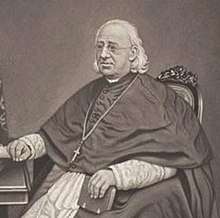Bede Polding

John Bede Polding, OSB (18th November, 1794 in Liverpool, England – 16 March 1877 in Sydney, Australia) was the first Roman Catholic Bishop and then Archbishop of Sydney, Australia.
Early life
Polding was born in Liverpool, England on November 18, 1794.[1] His father was of Dutch descent and his mother came from the Brewer family, recusants since the sixteenth century. His family name was also spelled Poulden or Polten. His parents died and at age 8 he was placed in the care of his uncle, Father Bede Brewer, president-general of the English Benedictine Congregation.
Polding was first taught by the Benedictine nuns of the Convent of Our Lady of Consolation of Cambray, who as refugees from revolutionary France were located at Much Woolton, near Liverpool. At 11, he was sent to St Gregory's Benedictine College, at Acton Burnell, near Shrewsbury, Shropshire.[2] On 15 July 1810 Polding was admitted to the religious community, taking the name of Bede, in honor of the saint, and of his uncle.[3] He received minor orders in 1813 from Bishop Milner at Wolverhampton, was ordained priest by Bishop Poynter at Old Hall College on 4 March 1819, and filled in turn the offices of parish priest, prefect, novice-master, and sub-prior in his monastery. In 1819 Polding's cousin, Bishop Edward Bede Slater, was appointed vicar-apostolic with jurisdiction over Mauritius, Madagascar, the Cape, New Holland and Van Diemen's Land.[4]
Experiences in Sydney
In 1834 Polding was appointed bishop of Hiero-Caesarea in partibus infidelium and vicar-apostolic of New Holland, Van Diemen's Land and the adjoining islands.[4] Polding and party arrived first in Hobart on 6 August 1835 leaving a priest and a student there and arrived in Sydney on 13 September 1835. The authorities soon realized the good effect his influence was having, and arranged that, on the arrival of every ship-load of convicts, all the Catholics should be placed at his disposal for some days, during which the bishop and his assistants saw each prisoner personally and did all they could for them before they were drafted off to their various destinations.[2] Polding traveled widely throughout Australia and was regarded as hard-working. He traveled to Europe in November 1840; during his absence Francis Murphy was appointed vicar-general of the diocese.
Polding was appointed the first bishop of Sydney on 5 April 1842, and Archbishop on 22 April 1842.[4] As a result of a successful diplomatic mission to Malta, he was made a Count of the Holy Roman Empire and assistant at the pontifical throne.[5]
Despite his many successes as a founding bishop, Polding experienced a degree of resistance from his largely Irish Catholic church in Australia. Even after the English Catholic Emancipation Act of 1829, the Irish were resistant to non-Irish bishops.[5] The British anti-clerical laws of the Reformation Parliament and the Act of Supremacy had bred deep resentment among the Irish of the English, and the consequences of the dissolution of monasteries during the English Reformation had left Polding deeply committed to the primary vision of restoring monasticism in English-speaking lands such as Australia.
He helped establish the University College of St. John, Sydney and Mary's College, Lyndhurst.[5] Polding traveled again to Rome in 1846 hoping to obtain a coadjutor bishop and Benedictine nuns to help in his diocese. He was successful in these quests and also gained approval for the establishment of Melbourne as a separate see. With his support, the Religious Sisters of Charity began the House of the Good Shepherd. In 1857 Polding the Sisters of the Good Samaritan, an Australian congregation of Religious women.[6]
In January 1874, he retired to Sacred Heart Presbytery, Darlinghurst.[1] He died on 16 March 1877 in Sydney, aged 82, and was initially buried in Petersham Cemetery, before being reinterred St Mary's Cathedral.
Legacy
Apart from the many churches he founded, Polding began the construction of the second St Mary's Cathedral, Sydney in 1868, where he was later re-buried. Polding also founded the Sisters of the Good Samaritan in Sydney.
References
- 1 2 "John Bede Polding", Roman Catholic Archdiocese of Sydney
- 1 2 Huddleston, Gilbert. "John Bede Polding." The Catholic Encyclopedia Vol. 12. New York: Robert Appleton Company, 1911. 17 Feb. 2018
- ↑ Lennon, Troy. "Australia’s first Catholic Archbishop Bede Polding won independence for convict colony Catholics", The Daily Telegraph, April 14, 2017
- 1 2 3 Nairn, Bede. "Polding, John Bede (1794–1877)", Australian Dictionary of Biography, National Centre of Biography, Australian National University, published first in hardcopy 1967
- 1 2 3 Tout-Smith, D. (2003) "John Bede Polding, Archbishop (1794-1877)" in Museums Victoria Collections
- ↑ Sisters of the Good Samaritan of the Order of St. Benedict
![]()
Sources
- Bede Nairn, 'Polding, John Bede (1794–1877)', Australian Dictionary of Biography, Volume 2, MUP, 1967, pp 340–347.
- Serle, Percival (1949). "Polding, John Bede". Dictionary of Australian Biography. Sydney: Angus and Robertson.
| Catholic Church titles | ||
|---|---|---|
| Preceded by New title |
1st Catholic Archbishop of Sydney 1842–1877 |
Succeeded by Roger Bede Vaughan OSB |